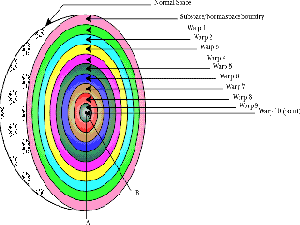Subspace Geometry
The Relationship between Warp, Subspace and 'Normal Space' is always the most difficult concept to grasp when discussing Stellar Physics. Subspace is simple the 'substrate' on which our universe exists. The "subspace barrier" is the albeit flimsy dividing line between the two continuums and a 'Subspace Field' is either a natural or artificial intrusion of Subspace into 'Normal Space'
How can a ship move faster than the speed of light if its beyond the laws of natural physics.?
First we must understand that each point in subspace coincides with and equal point in 'Normal Space', then we will examine a simplified structure of what subspace would look like.
Imagine the universe as a series of spheres, one nested inside the other.
Observation shows us that each layer of Subspace is smaller as you approach the center. When traveling through subspace, as in Warp, you don't actually move faster put the distance is smaller. It can be said, in error mind you, that you bend or warp 'Normal Space' to make it smaller.
The closer we sink towards the central point, the shorter the distance traveled. Subspace is like a pressurized fluid contained within a balloon of normal space. Causing a rupture in the skin allows subspace to come gushing out, explaining the importance of the Warp 5 speed limit. If subspace were to leak out, eventually normal space would collapse just like a balloon with the air let out.
How does a ship accelerate at faster than light?
A powerful, asymmetric subspace field is established around the ship by the warp nacelles. This 'Warp Field' wraps around the ship in a two-lobed bubble, with the locus at Main engineering (by design). The shape of the ship determines the efficiency of the field, and this explains why the Starships have such a sleek design. Meanwhile, the subspace field reduces the inertial mass of the ship, aiding in maneuvering.
In fact, a small subspace field is kept around the ship at Impulse speeds, so the Impulse drives have less mass to push around. However, this is only a side effect and is NOT the mechanism used to allow FTL travel.
The subspace field forces the ship to take on the reference frame of subspace itself, which is a special reference frame, circumventing the limits of Special Relativity. So if an artificial Subspace field can mimic true Subspace and allow FTL travel by Warping 'Normal Space' and Relative Distances, what keeps a ship from accelerating into infinitely. Simply a subspace field must be sustained with energy. Without constant energy the Field decays and the vessel slips back into 'Normal Space'.
This is the Basis of Subspace, Warp Field and FTL Travel. The reality of is as varied as 'Normal Space'. With Subspace Implosions, Inverted Subspace Warp Field and Static Warp Bubbles, Subspace bubbles, the Applications of Subspace Theory are infinity complex.
